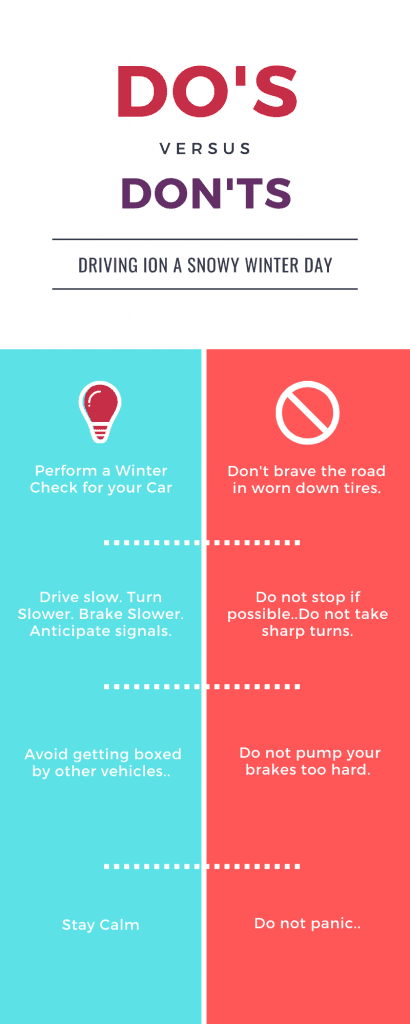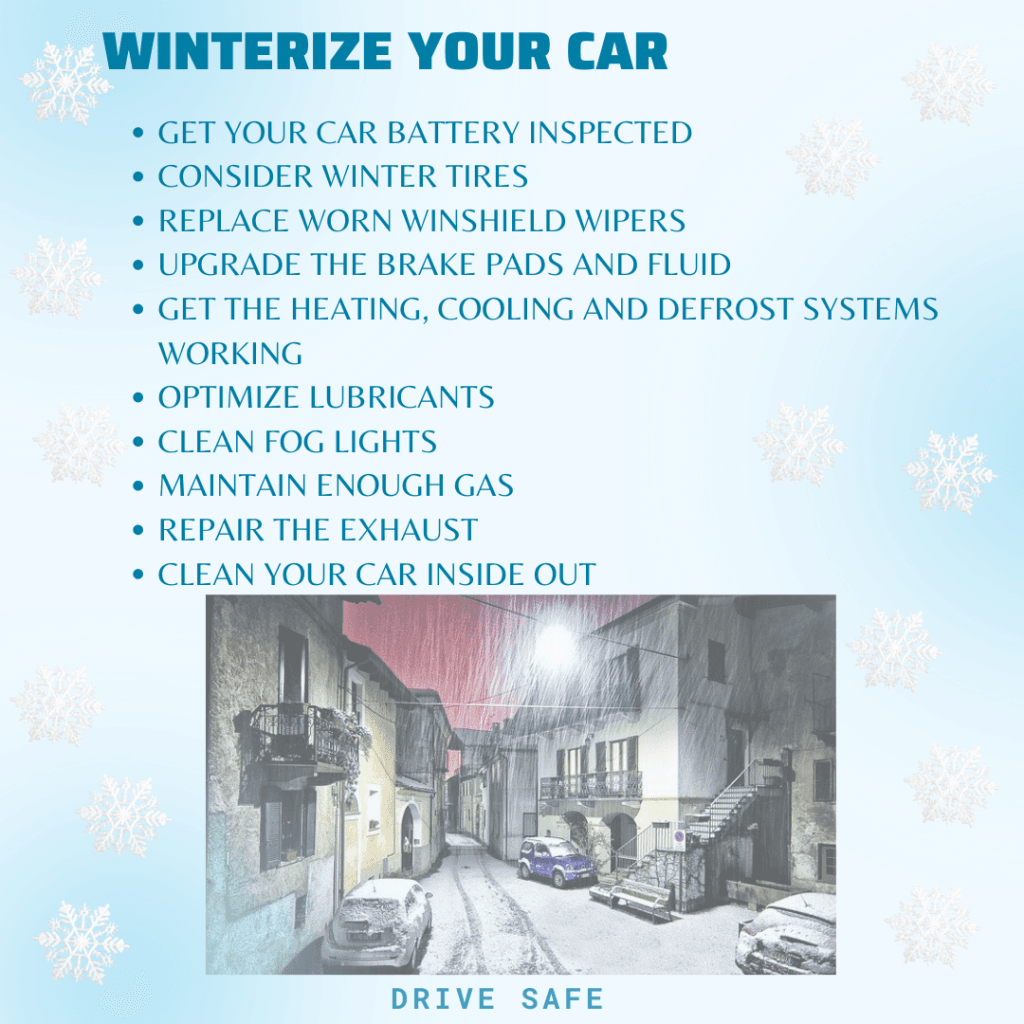With the winters setting in, drive through snowy roads is a treat. The scenic beauty is something that a lot of us look forward to. However, if you are at a place that is persistently cold and chilly for the most part of the year, you probably do not find it as thrilling.
However, appealing the snowy view might be, the last thing that we could wish for is getting our vehicle stuck in the snow. Regular drivers of the icy terrain might be used to such emergencies but when you are actually there, it is a real nightmare.
Little preparation and caution will go a long way in keeping you safe and drive a pleasant one. Know the below do’s and don’ts while driving in the winters.

Also Read: How You Can Enjoy the Great Outdoors this Winter
Let’s get your car unstuck from the snow with these 12 tips to help you along the way, make sure you follow them all.
1. Why is your Car Stuck in the Snow?
Even before you start to think of freeing yourself, it will be important to know why your car has got stuck in the first place. More often than not, vehicles get stuck in the snow because they lose traction. The layers of snow prevent the wheels from coming in contact with the pavement. This ends up with the tires spinning uselessly without being able to push the vehicle around. And when this happens, spin no further. Get out of your vehicle and assess your options.
2. Clear up the Exhaust
As the first step to getting yourself unstuck, clear up your car’s exhaust of any snow. If the tailpipe is plugged with snow and ice, upon ignition, the gas will have nowhere to go. You don’t want to be sitting inside a cloud of carbon monoxide especially when you are already stuck in snow on the outside.
3. Clear up the Snow around the Tires
Before getting your car to move, it is important to clear up the snow around it. Especially the snow around your tires needs to be cleared as far as possible. In the winters, it is advisable to carry a shovel in your boot space. If you have one, use that. Else, look for any flat object to do the job. Even the wrench that comes with the jack in the car tool kit may be helpful. Shovel up to a few feet in front and behind each of the wheels. If there is snow above the level of clearance of your car, you will need to remove that as well. Be sure to dig out the snow from under the front and middle of the car. Clearing up under the engine and exhaust will help when you are trying to rock the car later.
Another challenge is to keep the shoveled snow away. Use rock salt to melt the ice. Salt pellets and pet safe ice melting solutions are available in the market, these could come in handy if you have them in stock. Let the material stay put on the ice for some time and you will see the ice melt down.
4. Create Traction
If you have a shovel to dig off the snow and ice around your wheels, hitting the pavement will be easier. Once you are there, the tires are likely to get the traction to free you up.
If you are still unable to get the required traction, you may need to get some kitty litter, sand, salt or gravel to get the grit. You will need several handfuls of those to throw around your tires to gain traction. In case you do not have any of these, the floor mats of the car may rescue you. They would give the tires just enough grip.
Do not use any blankets or comforters available with you. They could come in useful in case you are stuck for longer than you think.
While you try to gain traction for the driving wheels of your vehicle, do not forget to check the control system for having turned off traction control.
Using a pair of snow chains can also rescue you. But be mindful of buying a chain that fits your tire. You must also practice installing the chain at home before you need to do so desperately.
5. Shift to the Lowest Gear
Before igniting the engine, remember to keep shift to the lowest gear. For those of you who are used to driving automatic transmission vehicles, this reminder is especially for you. It is mandatory to shift to the lower gear to allow the tires more power as well as help them move slowly. The lower gear will add traction control and prevent the spinning of tires.
6. Switch to All Wheel Drive
If your vehicle has an all-wheel-drive (AWD) or four-wheel drive (4WD) feature, you are at an advantage. The low range setting provides some serious power to the wheels when driving in snow, water, mud, or rocky terrains.
In case, your car has a front wheel drive (FWD) only, keep moving your wheels right and left repeatedly. As the ground touch points keep changing, the tires get traction sooner.
7. Straighten your Wheel
If you have an all-wheel-drive vehicle, keep your wheels straight and steady. When a car is stuck in the snow, moving straight is a lot easier than having to turn around bends.
8. Be gentle on Gas
We get it, you are stressed and unsure of how to get your car unstuck but do not vent it by flooring the gas. You may be drawn to doing it, but don’t. Be gentle with the engine and gas. It will do more harm than good. Take it slow on the pedal. Give it short spells of gas and release. Spinning wheels will only get you into deeper trouble.
9. Rock your Car
Once you have cleared enough snow from around the tires, chassis, and exhaust of your vehicle. Turn on the engine and give little strokes to the pedal. Turn to the lowest gear and get ready to move. Start on the reverse. The trick here is to quickly shift between reverse and forward gears. A few rounds of this back and forth exercise along with required traction and a few feet of snow cleared path for the wheels should give the car stuck in snow enough momentum to get going. Not to forget, be mindful of the gas. Keep your windows rolled down and carefully listen if your wheels start spinning. If they do, stop there.
10. Depressurize
If traction is what you think that’s keeping your car from moving, try the last resort. Deflate the tires, letting out just enough air so they are visibly lower. Reducing the pressure will cause the wheels to sag allowing more surface contact between the rubber and the pavement thereby making room for more traction control.
You cannot have a tire pressure gauge? Simply use a pen or even your key to press the release valve.
Before you get to do this, know and make sure if you can have the tires refilled nearby. It is dangerous to drive with inadequately inflated tires. We surely do not want you to be stuck in snow with the added problem of flat tires.
11. Ask for Help
Did you try it all and still your car is stuck in snow? Get to your handheld if you are lucky to find a network and call for roadside assistance. They can have your vehicle towed to a safe zone and help you get back on the road.
If luck is not on your side with your low power mobile and scanty network, do hesitate to try and take help from people passing by or nearby shops or houses.
12. Keep Calm
This is the last but most important tip. Getting stuck in the winters is common but what must not happen is you lose your calm and panic. Use the resources from within your car and around and try all that you can. All the above tips will help you and you can possibly hit the road on your own only if you keep calm.
However, if you find yourself stuck and unable to find your way, the best you could do is call for help and keep yourself safe and warm.
Also Read: Be Prepared for Winter Driving
Is your car winter ready?
Good news if you have escaped getting stuck in the snow until now. But is your car winter ready?
The following checkpoints should help you winterize your car if you have not done it yet.
Winterize Your Car
- Get your car Batter inspected
- Consider Winter Tires
- Replace worn Windshield Wipers
- Upgrade the Brake Pads and Fluid
- Get the heating, cooling and defrost systems working
- Optimize Lubricants
- Clean Fog Lights
- Maintain enough Gas
- Repair the Exhaust
- Clean your Car inside Out

What to carry for Safe Winter Driving
As it is often said, ‘Better be Prepared than Sorry’. It is a good idea to be prepared for roadside emergencies when driving on a chilly winter day. To avoid the ice and snow piled up on the streets getting you stuck, carry your own gear ready. Make sure to get a winter drive kit ready in your boot before you hit the road. Check out our list below so that you do not miss out on anything.
Your Snowy Drive Kit
- An easy to Carry Shovel.
- Snow/ Ice Scraper to clear your Windows and Lights
- Jumper Cables to bring your Dead Battery to Life
- A small empty Gas Can
- An extra Battery Pack
- An in condition Spare Tire
- A small Air Compressor
- First Aid Kit
- A Basic Tool Kit
- Kitty Litter
- Warm Blankets
- Snacks
- Drinks







